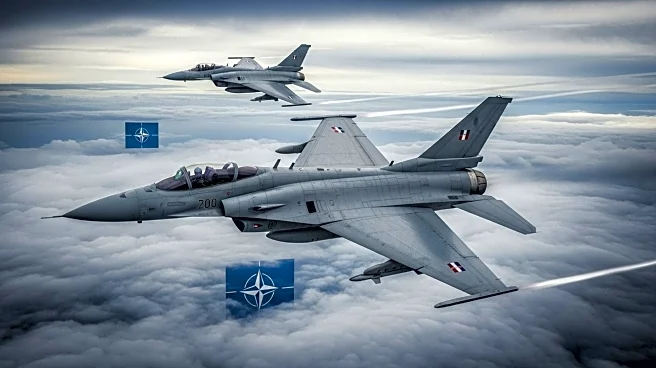What's Happening?
On September 19, 2025, three Russian fighter jets entered Estonian airspace, marking the third such incident this month involving Russian aircraft testing NATO's eastern borders. The jets approached Tallinn before being intercepted by Italian jets. Estonia has invoked NATO's Article 4, which calls for urgent consultations among alliance members. This incident follows similar airspace violations in Poland and Romania, where Russian drones have crossed borders, leading to heightened tensions in the region. Estonia's Foreign Minister Margus Tsahkna described the incursion as unprecedentedly brutal, emphasizing the need for increased political and economic pressure on Russia.
Why It's Important?
The breach of Estonian airspace by Russian fighter jets underscores the escalating geopolitical tensions between Russia and NATO countries. Such provocations could lead to increased military readiness and potential conflict in Eastern Europe. The invocation of NATO's Article 4 signifies the seriousness of the situation, as it requires member states to convene for urgent discussions. This incident may influence EU and NATO policies, potentially leading to stronger sanctions against Russia and increased military support for Eastern European countries. The ongoing violations highlight the strategic importance of NATO's eastern borders and the need for robust defense mechanisms.
What's Next?
Following the airspace breach, NATO members are expected to hold urgent talks to address the security challenges posed by Russia's actions. Estonia has summoned Russia's chargé d'affaires in Tallinn, indicating diplomatic repercussions. The European Union may consider additional sanctions on Russian energy and financial transactions, as announced by European Commission President Ursula von der Leyen. NATO's response could include increased military presence in Eastern Europe and enhanced defense capabilities to deter further provocations. The situation may also prompt discussions on strengthening NATO's collective defense strategies.
Beyond the Headlines
The repeated airspace violations by Russia could have long-term implications for European security and NATO's strategic posture. These incidents may lead to a reevaluation of NATO's defense policies and increased collaboration among member states to counter Russian aggression. The geopolitical tensions could also affect international relations, with potential impacts on global energy markets and economic stability. The situation highlights the importance of maintaining a unified front among NATO allies to ensure regional security and deter future provocations.









